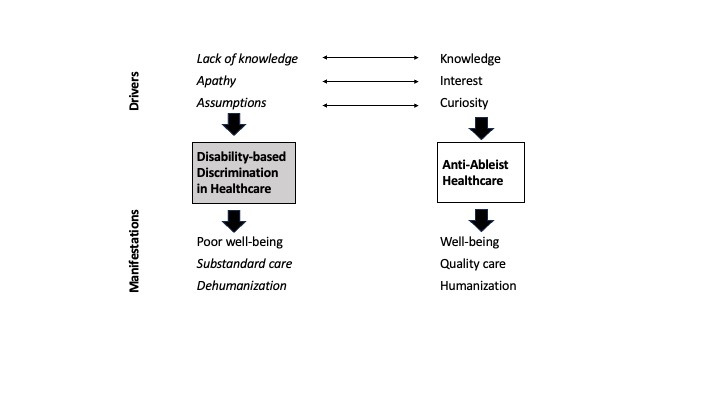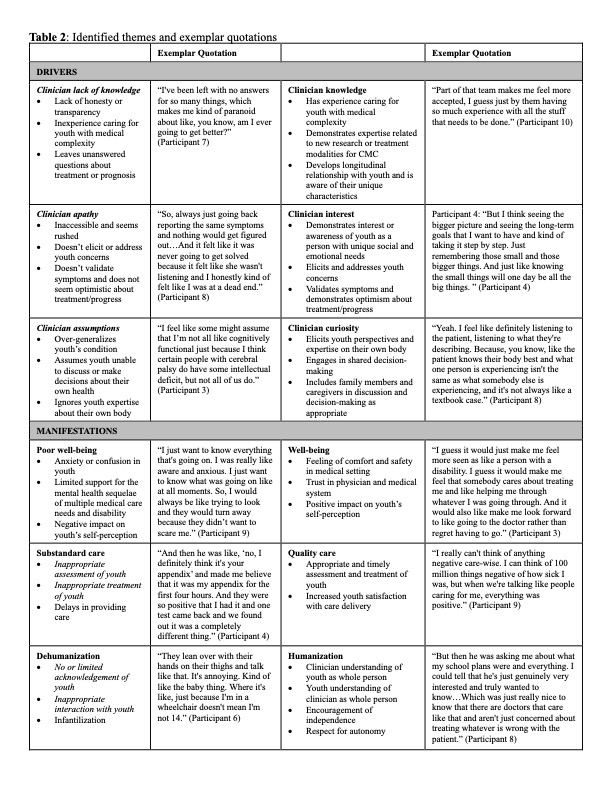Children with Chronic Conditions 1
Session: Children with Chronic Conditions 1
502 - Understanding and Mitigating Ableism in Pediatric Care: A Qualitative Study of the Perspectives of Youth and Young Adults with Medical Complexity
Sunday, April 27, 2025
8:30am - 10:45am HST
Publication Number: 502.6605
Alexandra Kimmel, Boston Children's Hospital, Brookline, MA, United States; Kathleen Huth, Boston Children's Hospital / Harvard Medical School, Boston, MA, United States; Jennifer T. Queally, Boston Children's Hospital, Boston, MA, United States; Mather J. Stover-Ling, Boston Children's Hospital, Endicott, NY, United States; Arda Hotz, Boston Children's Hospital, Boston, MA, United States; Julie T. Irish, Boston Children's Hospital, Boston, MA, United States

Kathleen Huth, MD MMSc
Assistant Professor of Pediatrics
Boston Children's Hospital / Harvard Medical School
Boston, Massachusetts, United States
Presenting Author(s)
Background: Recent literature describes discrimination in healthcare for children with medical complexity and disability. Prior work has focused on the views of family caregivers and healthcare professionals, while little is known about the perspectives of youth with medical complexity on their care and opportunities for improvement.
Objective: To explore the perspectives of youth and young adults with medical complexity and disability in their healthcare, with the overarching goal of informing targeted disability training for healthcare professionals.
Design/Methods: Using qualitative thematic analysis, we conducted semi-structured interviews with youth and young adults ages 14-24 years who receive care in a consultative complex care service or associated multidisciplinary clinics (Spina Bifida Center, Cerebral Palsy Center) at a children’s hospital. Participants were offered the opportunity to have a family caregiver present during the interview. Interviews were conducted and recorded over a video-conferencing platform and then transcribed. Data collection and analysis occurred iteratively. Two reviewers independently coded each transcript, refined and grouped codes into broader themes, and compared findings with existing frameworks.
Results: Ten youth/young adults participated, representing different underlying diagnoses and disabilities (Table 1). Identified themes included clinician-based drivers of both disability-based discrimination (e.g. lack of knowledge, apathy, assumptions) and anti-ableist healthcare (e.g. knowledge, interest, and curiosity) (Table 2). Manifestations of discrimination (e.g. poor well-being, substandard care, and dehumanization) and anti-ableist care (e.g. well-being, quality care, and humanization) were also described. Findings were synthesized into a conceptual framework (Figure 1).
Conclusion(s): Youth and young adults with medical complexity perceive both disability-based discrimination and anti-ableist practices in healthcare, and describe the impact on their health and well-being. Understanding the perspectives of the patients expands our understanding of drivers and manifestations of ableism and provides opportunities to foster desired clinician behaviors through targeted training and intervention.
Table 1. Participant Demographics
.jpg)
Figure 1. Conceptual framework of disability-based discrimination and anti-ableist healthcare synthesized from the perspectives of youth and young adults with medical complexity
 This figure depicts clinician-based drivers of both disability-based discrimination and anti-ableist healthcare as well as the manifestations of each, as experienced by youth/young adults. Italicized text indicates themes identified in this study that align with an existing framework of disability-based discrimination in pediatric healthcare. Double-sided arrows indicate the relationship between drivers and how a shift in each driver can change the healthcare experience for youth/young adults with medical complexity.
This figure depicts clinician-based drivers of both disability-based discrimination and anti-ableist healthcare as well as the manifestations of each, as experienced by youth/young adults. Italicized text indicates themes identified in this study that align with an existing framework of disability-based discrimination in pediatric healthcare. Double-sided arrows indicate the relationship between drivers and how a shift in each driver can change the healthcare experience for youth/young adults with medical complexity.Table 2

Table 1. Participant Demographics
.jpg)
Figure 1. Conceptual framework of disability-based discrimination and anti-ableist healthcare synthesized from the perspectives of youth and young adults with medical complexity
 This figure depicts clinician-based drivers of both disability-based discrimination and anti-ableist healthcare as well as the manifestations of each, as experienced by youth/young adults. Italicized text indicates themes identified in this study that align with an existing framework of disability-based discrimination in pediatric healthcare. Double-sided arrows indicate the relationship between drivers and how a shift in each driver can change the healthcare experience for youth/young adults with medical complexity.
This figure depicts clinician-based drivers of both disability-based discrimination and anti-ableist healthcare as well as the manifestations of each, as experienced by youth/young adults. Italicized text indicates themes identified in this study that align with an existing framework of disability-based discrimination in pediatric healthcare. Double-sided arrows indicate the relationship between drivers and how a shift in each driver can change the healthcare experience for youth/young adults with medical complexity.Table 2


